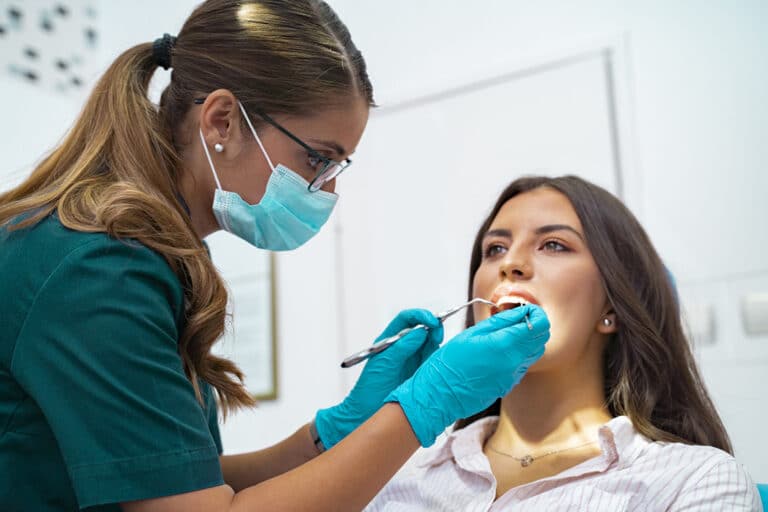Oral Cancer Screening In Brisbane
What is oral cancer?
Oral cancer, also referred to as mouth cancer, is the development of cancerous cells in the tissues of the mouth, lips, throat, and nearby areas. Oral cancer is considered a kind of head and neck cancer that can be life-threatening if diagnosed late. The risk of oral cancer is relatively higher in people over 40 years of age.
The oral cancer death rate is unfortunately high because it is usually discovered late and has already developed and spread throughout other parts of the body, like the lymph nodes of the neck. Oral cancer affects at least three Australians (men are at higher risk) every day, and the patients’ death rates are high because of late detection.
Oral cancer awareness
Awareness=Early Detection=Higher Survival Chance
It’s crucial to be wary of any warning signs that may be jeopardizing your oral health. As you know, cancerous cells can develop in any part of the body and grow out of control before we know it, and mouth cancer is no exception! By raising your oral cancer awareness, you will benefit from having early detection of the disease and elevate your chance of survival.
Early diagnosis will give you the chance to start your treatment as soon as your dentist or health provider spots the signs. Late detection of oral cancer will significantly decrease survival rates and is a leading cause of death for this dangerous disease.
FYI: April is Oral Cancer Awareness Month.
What are the early signs and symptoms of oral cancer?
Signs and symptoms of oral cancer
Oral cancer can strike in cheeks, gums, tongue, hard and soft palate, and the floor of the mouth. It’s essential to know the symptoms and know where to look for them so you can seek treatment urgently.
Be on the lookout for the following symptoms and refer to your dentist immediately if you notice them:
- painful chewing or swallowing
- red or white patches in the mouth
- persistent sore, ulcer, or lumps that won’t heal
- swollen lymph glands
- unexplained numbness, tenderness, or tingling in the mouth
- difficulty moving your tongue or jaw
- painful or even not so painful lump
- unexplained earache or mouth pain
- unexplained weight loss
- chronic sore throat or hoarseness
Generally, your dentist or an appropriately qualified health practitioner should check any irregularities in the mouth. Regular dental check-up visits with your dentist and increased awareness about oral diseases will ensure your good oral health. They can spot any problem at its early stages and prevent it from developing further.
What are oral cancer risk factors?
While anyone can be diagnosed with oral cancer, some risk factors can increase the risk of developing oral cancer.
- tobacco use
- sun exposure
- heavy alcohol consumption
- previous cancer diagnosis (family history)
- HPV, Human Papilloma Virus
FYI:
- Dental professionals link all forms of tobacco use with an increased risk of oral cancer; try to quit smoking to lower your risk of developing oral cancer.
- Sun exposure can increase the risk of developing lip cancer. That’s why our Brisbane dental professionals recommend using lip balm with SPF 30 if you are at risk of excessive sun exposure.
- Human Papilloma Virus is a sexually transmitted virus
The risk of oral cancer increases if you:
- are a smoker
- are a heavy alcohol consumer
- are a man over 40 years old

Oral Cancer Screening
No special preparation is needed; our Brisbane dental experts can do it during your regular dental visit.
A dentist or an appropriately qualified health practitioner carries out oral cancer screenings to check for early signs of cancer in the oral cavity. Oral cancer screening will help with the early detection of the condition. Cancer screening can be considered a precautionary activity and can be done during your regular dental check-up.
During regular screenings, your dentist will look for any abnormalities or unusual lumps in your mouth and neck to ensure there are no warning signs of mouth cancer. Patients’ survival rates will be significantly improved by regular screenings and early detection of the disease since their chance of successful treatment will be higher.
Stages of oral cancer
Four stages of oral cancer are briefly described here:
Stage 1: 2 centimetres tumour, the lymph nodes not affected
Stage 2: 2 to 4 centimetres tumour, the lymph nodes not affected
Stage 3
- either 4 centimetres tumour or larger, the lymph nodes not affected
- or any size tumour, one lymph node affected
Stage 4: any size tumour, the nearby structures are involved, the lymph nodes affected
Is oral cancer surgery dangerous?
Any surgical procedures carry risks, but surgery is sometimes needed to remove the cancerous cells. The patient may experience bleeding and infection after the surgery and may not eat or talk easily.
Do all dentists do cancer screenings?
Yes. You can ask for a cancer screening during your regular dental check-ups. Sometimes, your dentist will perform a cancer screening even if you have no signs of the condition
How often should you get oral cancer screening?
Our Brisbane dentists suggest people over 40 years of age have annual screenings if however, you are under 40 years old, you can have cancer screening every three years.




































